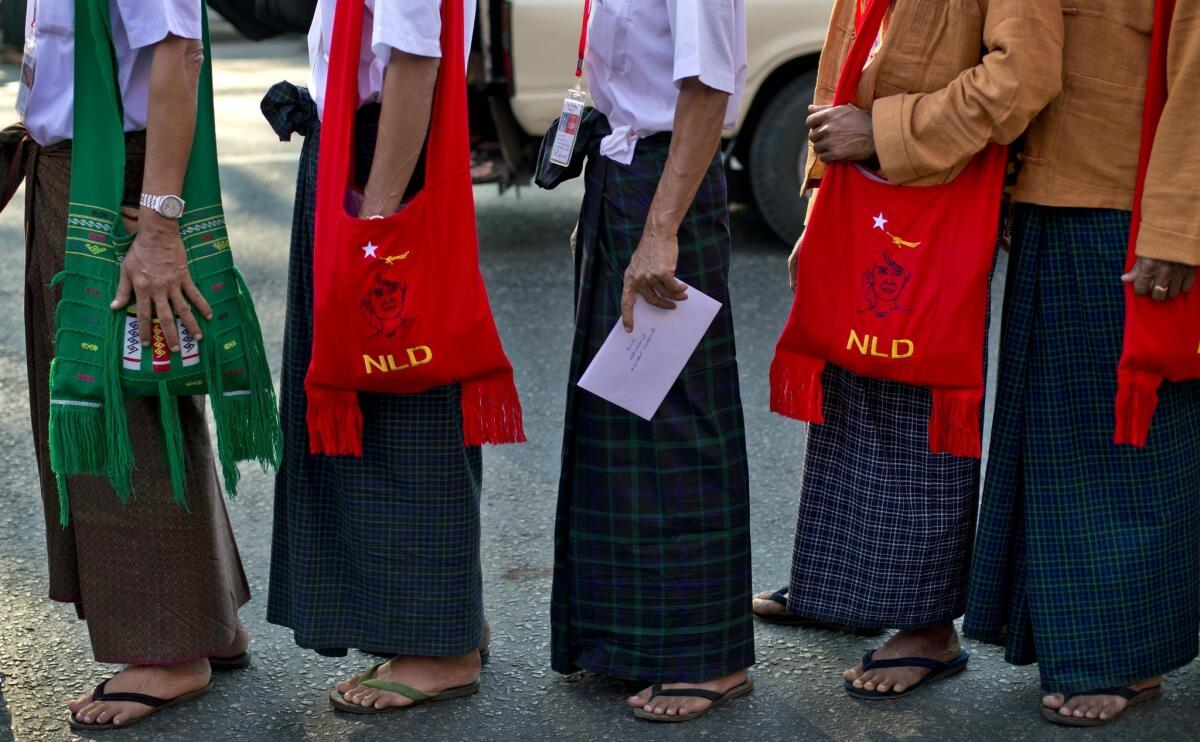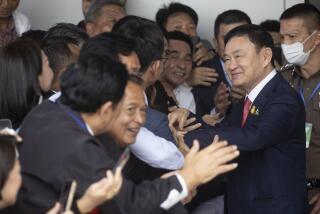Myanmar opposition party meets in open to elect leaders

- Share via
NEW DELHI, India -- Myanmar’s main opposition party led by Nobel laureate lawmaker Aung San Suu Kyi began three days of meetings in Yangon on Friday to elect leaders for the first time in its 25-year history.
The fact that the government allowed the general assembly of the once-banned party is in itself a milestone in a country emerging from decades of repressive military rule.
Suu Kyi, who spent 15 years under detention before her release in late 2010, is widely expected to be reappointed party head.
While global attention has focused on the government’s many weaknesses as it struggles to become more responsive and democratic, the opposition National League for Democracy, or NLD, faces similar problems.
Even as its leaders, many of whom spent years in jail, relish their growing popularity and legitimacy, many are relatively old. Suu Kyi is 67, while fellow cofounders Tin Oo and Win Tin are 86 and 83, respectively.
“It is necessary to strengthen the party with new blood,” Suu Kyi wrote in D-Wave, the party’s weekly newspaper.
In addition to electing a party chairman and 120-member central committee, the 900 delegates will try to hammer out a party platform in advance of 2015 general elections. In the past, it focused more on what it opposed than what it stood for.
Long years as “outlaws” far from power has also left the party disorganized, hierarchical, short on management skills and not always true to its democratic ideals. During two decades in the shadows, leaders were appointed, decisions made secretly, communication restricted.
“We don’t like the generals, but at least they have experience,” said Thiha Saw, the editor of Open News Journal. “The party’s trying to do capacity building, but will they be ready by 2015?”
While Suu Kyi is very popular, her stature has discouraged decentralized decision-making, critics say, even as infighting and alleged cheating have tarnished local elections held since mid-2012 among the party’s 1.2 million members.
In a news conference Thursday, member Thant Zin said party leaders acted “like a military junta” by disinvited four other members from its congress, accusing them in a statement without elaborating of trying to “destroy the party’s unity.”
The civilian government, still controlled by a military that is guaranteed 25% of the seats in parliament, has held elections, released political prisoners and eased media restrictions since President Thein Sein took power in 2011.
Where government intelligence officials once pretended to drink tea opposite NLD headquarters, photographing anyone who entered, red peacock party flags are now openly sold around Yangon, while tables outside party headquarters sell mugs, key chains, posters and cellphone cases adorned with Suu Kyi’s image.
The big prize is an outright NLD victory in the 2015 election, displacing the ruling Union Solidarity and Development Party, or USDP, which is dominated by former military officials. But moving too fast in reducing the military’s clout could prompt a backlash, something neither civilian party wants.
“If they lose their political role, the military could strike back,” said Maung Thura, a comedian, publisher and former political prisoner also known as Zarganar. “We need to move carefully.”
Fresh in many people’s memories is the 1990 election in which the NLD won an overwhelming majority and the regime refused to recognize the results, leading to a brutal crackdown. Some believe this fear could engender some sort of power-sharing agreement between the two parties.
“Both the NLD and the USDP have a common interest,” said Ye Niang Moe, director of the Yangon Journalism school. “They don’t want to see the tanks on the street.”
That, however, could anger NLD stalwarts, many of whom are former political prisoners, wary of cooperating with their former oppressors turned USDP leaders. The NLD has already come under fire for accepting donations from businessmen with close military links.
“The idea that the NLD sweeps 70% of the vote in 2015 and everyone goes away happy won’t work,” said Morten Pedersen, senior lecturer with the Australian Defense Force Academy. “And the NLD’s been waiting a long time, they don’t want to back down.”
While the 2008 military-crafted constitution bars Suu Kyi from running for president because she married a Briton and has two sons with foreign passports -- rules apparently written specifically to block her candidacy -- she hasn’t ruled a run. The party has made constitutional reform a priority.
As Suu Kyi has morphed from a near saint as the long-detained democracy icon into a politician, human rights and other international groups have criticized her for failing to support the persecuted Muslim Rohingya community, officially stateless, and ethnic Kachin weathering attacks from the Myanmar army.
“The lady has an obligation to say something,” said Abu Tahay, a Rohingya and leader of the National Democratic Party for Development. “She’s the democracy icon of this country who always highlighted human rights. She shouldn’t just think about power struggles.”
Others said this is the inevitable cost of crafting a more democratic system.
“She’s changed because she’s a clever politician,” said Kyaw Yin Myint, Yangon-based bureau chief with the Kumudra Journal weekly newspaper. “When you get close to the military, you need to know how to handle them. She may be against something, but sometimes she’s quiet because there’s no gain.”
[For the Record, 11:55 a.m. March 8: An earlier version of this post identified Yangon as Myanmar’s capital. The capital is Naypyidaw. Yangon is the nation’s largest city and former capital.]
ALSO:
Body of Hugo Chavez to remain on view under glass
Dancer denies ordering use of acid in attack on Bolshoi director
North Korea vows to end nonaggression pacts with South Korea
More to Read
Sign up for Essential California
The most important California stories and recommendations in your inbox every morning.
You may occasionally receive promotional content from the Los Angeles Times.










